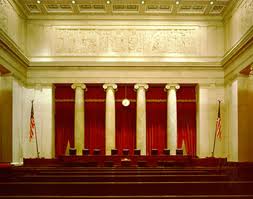United States Supreme Court Chief Justice Unlikely to Be the Court’s Most Senior Member
 Wisconsin, like a number of states, designates the senior member of its state supreme court in terms of service as the Chief Justice. The United States Supreme Court, in contrast, uses a system in which the President of the United States chooses a new Chief Justice every time the existing Chief dies or steps down.
Wisconsin, like a number of states, designates the senior member of its state supreme court in terms of service as the Chief Justice. The United States Supreme Court, in contrast, uses a system in which the President of the United States chooses a new Chief Justice every time the existing Chief dies or steps down.
Although the new Chief Justice can be chosen from the ranks of sitting justices, thirteen of the sixteen Chief Justices in U.S. history were appointed to the position from outside the court (although one, Charles Evans Hughes, was a former Associate Justice). The Associate Justices elevated to the head of the Supreme Court were Justices Edward White (1910), Harlan Fiske Stone (1941), and Wisconsin’s own, William Rehnquist (1986).
One of the consequences of this system of appointment is that it has been quite rare in American history for the Chief Justice also to be the senior justice in terms of service on the court. Ordinarily the senior justice is not the Chief Justice, but the justice who sits on the Chief Justice’s immediate right.
Only four times in the Court’s 200+ year history has the Chief Justice also been its most senior member.
The first occasion came following the death of Justice Bushrod Washington in 1829. With Washington’s death, his Federalist colleague Chief Justice John Marshall became the Court’s senior member and continued to be until his death in 1835.
The other three Chief Justices to achieve “senior-most justice” status, were, not surprisingly, the three Chief Justices appointed from the ranks of the Associate Justices.
Following the death of John Marshall Harlan the elder in October of 1911, Chief Justice Edward White, who had only been Chief Justice for 10 months, but who had served on the Court since 1894, became the senior member and remained so until his death in May 1921. Harlan Fiske Stone (appointed in 1925) was already the senior member of the Court when he was appointed Chief Justice in 1941, a position he held until his death in 1945. (Stone’s seniority may have been the reason why President Franklin Roosevelt chose the liberal Republican over numerous Democratic contenders for the honor.)
The most recent Chief Justice to achieve senior justice status was William Rehnquist. Following the retirements of Associate Justices Byron “Whizzer” White and Harry Blackmun in 1993 and 1994, respectively, Rehnquist (appointed 1973) became the Court’s longest-serving member. He also served longer in that dual capacity, from August 3, 1994 (the day of Blackmun’s retirement), to September 3, 2005 (Rehnquist’s death), a period of 11 years and one month.

 Sixteen dignitaries from Turkey, including members of the Turkish Parliament, representatives from the Ministry of Justice, and professors, spent March 1 at Marquette Law School (MULS) to learn about Wisconsin’s experiences with restorative justice and mediation. The law school’s Restorative Justice Initiative organized a meeting with them and Wisconsin Supreme Court Chief Justice Shirley Abrahamson, Wisconsin Supreme Court Justice Ann Walsh Bradley, retired Wisconsin Court of Appeals and Barron County Circuit Court Judge Edward Brunner, Milwaukee County Chief Judge Jeffrey Kremers, Milwaukee County Circuit Court Judge Mary Triggiano, United States Attorney for the Eastern District of Wisconsin James Santelle, and Milwaukee County District Attorney John Chisholm, along with other prosecutors and Wisconsin restorative justice professionals. Professor and restorative justice scholar Mark Umbreit, from the University of Minnesota Center on Restorative Justice and Peacemaking, as well as MULS Professors Andrea Schneider and Michael O’Hear, also attended the meeting. The Turkish delegation is working with the United Nations’ Development Program on judicial reforms and traveled to the United States for a week-long visit to learn about the use of mediation and restorative justice in our American court system. The group had meetings in Washington D.C. and New York and then came to Marquette University for one day. The Turkish Parliament has already incorporated Victim-Offender Dialogues into the Turkish criminal code and is working on drafting mediation legislation and part of the civil justice system. I will be traveling to Istanbul later this week to be part of a workshop on restorative justice for judges and prosecutors in Turkey.
Sixteen dignitaries from Turkey, including members of the Turkish Parliament, representatives from the Ministry of Justice, and professors, spent March 1 at Marquette Law School (MULS) to learn about Wisconsin’s experiences with restorative justice and mediation. The law school’s Restorative Justice Initiative organized a meeting with them and Wisconsin Supreme Court Chief Justice Shirley Abrahamson, Wisconsin Supreme Court Justice Ann Walsh Bradley, retired Wisconsin Court of Appeals and Barron County Circuit Court Judge Edward Brunner, Milwaukee County Chief Judge Jeffrey Kremers, Milwaukee County Circuit Court Judge Mary Triggiano, United States Attorney for the Eastern District of Wisconsin James Santelle, and Milwaukee County District Attorney John Chisholm, along with other prosecutors and Wisconsin restorative justice professionals. Professor and restorative justice scholar Mark Umbreit, from the University of Minnesota Center on Restorative Justice and Peacemaking, as well as MULS Professors Andrea Schneider and Michael O’Hear, also attended the meeting. The Turkish delegation is working with the United Nations’ Development Program on judicial reforms and traveled to the United States for a week-long visit to learn about the use of mediation and restorative justice in our American court system. The group had meetings in Washington D.C. and New York and then came to Marquette University for one day. The Turkish Parliament has already incorporated Victim-Offender Dialogues into the Turkish criminal code and is working on drafting mediation legislation and part of the civil justice system. I will be traveling to Istanbul later this week to be part of a workshop on restorative justice for judges and prosecutors in Turkey.